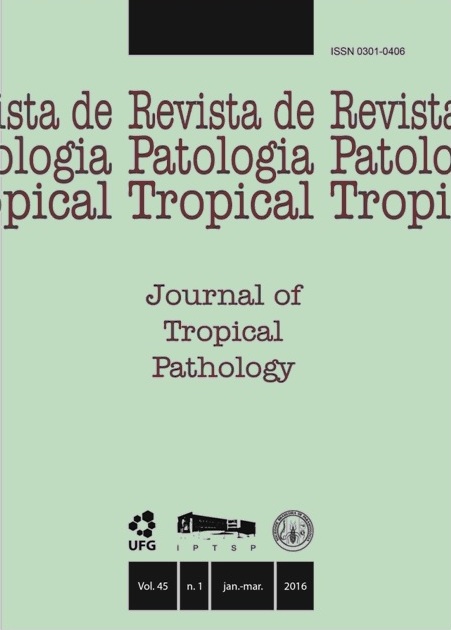PRESENCIA DE INFECCIÓN POR Trypanosoma cruzi Y Toxoplasma gondii EN PERROS DOMÉSTICOS DE LOCALIDADES RURALES EN EL NOROESTE ARGENTINO
DOI:
https://doi.org/10.5216/rpt.v45i1.40274Palavras-chave:
Perros, zoonosis, Salta, Chagas, toxoplasmosis.Resumo
Las zoonosis causadas por los parásitos Trypanosoma cruzi y Toxoplasma gondii son prevalentes en la Argentina y los perros cumplen el papel de reservorio además de padecer las enfermedades. Se considera una buena alternativa conocer la seroprevalencia de estas zoonosis en los perros debido a que son un reflejo de lo que ocurre en la población humana y en el ambiente. Nos propusimos conocer la seroprevalencia de infección por T. gondii y T. cruzi en caninos en cuatro zonas rurales de la provincia de Salta. Para la detección de anticuerpos anti-T. gondii se utilizó Hemaglutinación Indirecta (HAI) y para la detección de anticuerpos anti-T. cruzi, además de HAI, se usó Enzimoinmunoanálisis (ELISA). Fueron muestreados 209 canes y los resultados serológicos indicaron la presencia de anticuerpos anti-T. gondii en la localidad de La Unión, departamento Rivadavia en un 18,2% (4/22), en San Carlos con 20,5% (8/39), en Cafayate con 13,1 % (11/84) y en Embarcación departamento General San Martín, con 23.4% (15/64). Los anticuerpos anti-T cruzi sólo estuvieron presentes en los perros de la localidad de San Carlos con 28,2% (11/39). La frecuente seroprevalencia a T. gondii, encontrada en los perros de todas las localidades muestreadas sugieren contaminación ambiental por este parásito en la zona. El hallazgo de perros infectados por T. cruzi, en la localidad de San Carlos, nos sugiere la posibilidad de transmisión activa del parásito en un pasado reciente y nos alerta sobre la posibilidad de reservorio.
Downloads
Downloads
Publicado
Como Citar
Edição
Seção
Licença
The manuscript submission must be accompanied by a letter signed by all authors stating their full name and email address, confirming that the manuscript or part of it has not been published or is under consideration for publication elsewhere, and agreeing to transfer copyright in all media and formats for Journal of Tropical Pathology.

